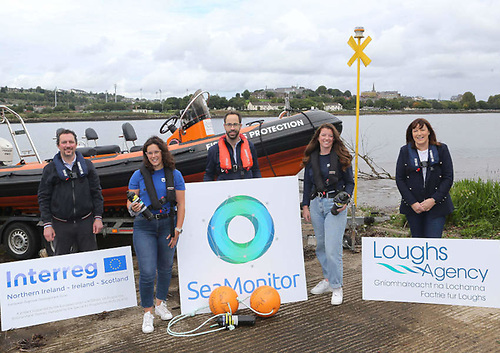Field personnel from the Ocean Tracking Network (OTN) based at Dalhousie University in Nova Scotia are currently in the North West working with the team servicing critical animal tracking infrastructure in support of the SeaMonitor project.
Led by the Loughs Agency and supported by eight leading marine research institutions, SeaMonitor is delivering Europe’s largest fish monitoring array using advanced, large-scale technology, as previously reported on Afloat.ie.
The project aims to track the movements of some of the ocean’s most vulnerable species including Atlantic salmon, flapper skate, basking sharks, seals and cetaceans.
Data collected by researchers will be used to help inform marine policy and management frameworks and support conservation measures.
OTN field personnel Cassandra Hartery and Caitlin Bate have been carrying out expert field work coordinated alongside Diego del Villar, senior scientific officer for the SeaMonitor project at the Loughs Agency, using large-scale acoustic telemetry equipment.
“OTN has once again come up trumps for the agency and the SeaMonitor project by lending their expertise to help our team with the retrieval and redeployment of Europe’s largest array,” said Loughs Agency chief executive Sharon McMahon.
“The ocean is a massive, dynamic and challenging environment to work in. Our priority is to get the equipment safely out of the water and I am delighted at the excellent progress to deliver such significant and innovative marine research data that will ultimately help protect some of our most important and vulnerable marine species.
“The agency’s specialist team together with project partners are continuing to work hard to ensure project objectives are delivered whilst following COVID-19 protocols and the amazing work undertaken recently puts us well ahead of schedule.”
Funding for the SeaMonitor project has been provided under the environment objective of the European Union’s INTERREG VA Programme, which is managed by the Special EU Programmes Body (SEUPB), to the tune of €4.7m.
Match-funding for this project has been provided by the Department for Agriculture, Environment and Rural Affairs (DAERA) in Northern Ireland and the Department of Housing, Planning and Local Government in Ireland.
Key support and expertise was also provided by DEARA whose vessel, The Queen of Ulster, was used to take the project scientists out for the retrievals last week. Other vital field work was carried out at Loughs Agency headquarters in Derry and in Lough Foyle.
For more information about the project visit the Lough Agency’s SeaMonitor portal or follow the project on Twitter at @SeaMonitor1.

































































